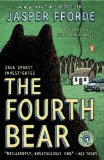 Jasper Fforde was in Atlanta last night for a reading, Q & A, and book signing, and I had the opportunity to purchase his latest novel, Shades of Grey, which is a departure from his “books about books”—the Thursday Next and Nursery Crime series. I brought my daughter with me, and she found the premise of his new book intriguing. It is set in the distant future after some catastrophic event, and the people who inhabit this post-apocalyptic society can only see one color. Accordingly, they divide themselves into groups based on which color they can see.
Jasper Fforde was in Atlanta last night for a reading, Q & A, and book signing, and I had the opportunity to purchase his latest novel, Shades of Grey, which is a departure from his “books about books”—the Thursday Next and Nursery Crime series. I brought my daughter with me, and she found the premise of his new book intriguing. It is set in the distant future after some catastrophic event, and the people who inhabit this post-apocalyptic society can only see one color. Accordingly, they divide themselves into groups based on which color they can see.
A few readers asked Fforde questions about interpretation of his books, and I want to try to paraphrase his answer, though I didn’t capture the exact wording. He said that a book only belongs to an author until someone else reads it. After that point, it belongs to the reader too. He described reading as a creative process, work very much akin to the process of actually writing the book, and he said there is room in books for many interpretations because of all the reader brings to a book; therefore, when he is asked whether he meant to comment about something particular with certain choices he makes, he turns the question back on the person who asked: “Well, what do you think?” He values the thoughts and interpretations of the readers as much as his own. I found that to be so beautifully expressed and so true to my own beliefs that when he signed my book, I explained that as an English teacher, I am often challenged by my students who don’t agree with an interpretation I share (whether my own or that of another reader or critic) and thus will insist that the author might not have meant it the way I am explaining it. I usually say that just because an author may not have intended it doesn’t make me wrong necessarily because we all bring certain experiences and knowledge to reading, and we make connections the author may not have intended or known we would make. I also add that many times authors will say they did intend something or other, even if it is not on a conscious level because we have such a vast repository of symbolic language. Now I can tell my students that Jasper Fforde, a successful published author from England, believes the same thing I do. I think it will give my explanation more authority.
If you haven’t read Fforde’s books and you consider yourself a book lover, do yourself a favor and check them out.










